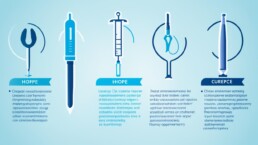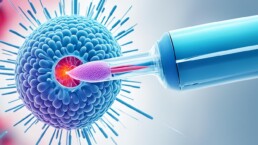Medically reviewed by Dr Chandril Chugh,
Renowned Neurologist and American Trained Specialist
Prostate cancer is one of the most common cancers in men, and early detection is crucial for effective treatment. While prostate cancer often doesn’t produce obvious symptoms in its early stages, there are several key warning signs that you should be aware of. Recognizing these symptoms and seeking prompt medical attention can improve your chances of early detection and proactive health management.
Table of Contents
ToggleKey Takeaways:
- Prostate cancer often doesn’t produce obvious symptoms in its early stages.
- Key warning signs include painful urination, frequent urination (especially at night), and blood in the urine or semen.
- These symptoms may also be caused by other conditions, so it’s important to consult with a healthcare professional for accurate diagnosis.
- Early detection and proactive health management are essential for effective treatment.
- Regular screenings and check-ups can help identify prostate cancer or any abnormalities.
Recognizing the Signs of Prostate Cancer
When it comes to recognizing the signs of prostate cancer, it’s crucial to be aware of the potential symptoms. By recognizing these signs early on, you can take proactive steps towards early detection and timely treatment. Understanding the signs can make a significant difference in managing your prostate health.
Here are some common signs and symptoms of prostate cancer to watch out for:
- Painful or burning sensation during urination or ejaculation
- Frequent urination, especially at night
- Difficulty starting or stopping urination
- Sudden onset of erectile dysfunction
- Presence of blood in the urine or semen
These symptoms may also be associated with other, less serious conditions. Therefore, it is essential to consult with a healthcare professional for an accurate diagnosis. A medical professional will consider your symptoms, medical history, and perform relevant tests to determine the cause of your symptoms.
Early detection plays a crucial role in effectively managing prostate cancer. Therefore, taking note of these signs and seeking medical attention promptly is vital. Remember, only a healthcare professional can provide a definitive diagnosis and guide you towards appropriate treatment options.
| Symptom | Significance |
|---|---|
| Painful or burning sensation during urination or ejaculation | This could indicate prostate cancer or other urinary tract conditions. |
| Frequent urination, especially at night | Excessive urination may be a symptom of an enlarged prostate or prostate cancer. |
| Difficulty starting or stopping urination | Problems with urination can be a sign of prostate cancer or related conditions. |
| Sudden onset of erectile dysfunction | Erectile dysfunction may indicate underlying vascular or neurological issues, including prostate cancer. |
| Presence of blood in the urine or semen | Blood in the urine or semen could be a symptom of prostate cancer or other conditions affecting the urinary tract. |
Remember, if you experience any of these symptoms, it is essential to consult with a healthcare professional for an accurate diagnosis. Early detection and immediate medical attention can make a significant difference in the effectiveness of treatment and overall prognosis.

Risk Factors for Prostate Cancer
Several risk factors have been identified that could increase a man’s chances of developing prostate cancer.
- Age: Age is a significant factor, with the likelihood of developing prostate cancer rising rapidly after the age of 50.
- Race and Ethnicity: Race and ethnicity also play a role in prostate cancer risk. African American and Caribbean men have higher prostate cancer rates compared to other races. On the other hand, Asian American and Hispanic/Latino men have lower rates.
- Family History: Family history is another important risk factor. Men with a father or brother who has been diagnosed with prostate cancer are at a higher risk.
It’s crucial to note that having one or more risk factors does not guarantee that an individual will develop prostate cancer. Similarly, men without any risk factors may still be diagnosed with the disease. Regular screenings and discussions with healthcare professionals are essential for early detection and proper management.
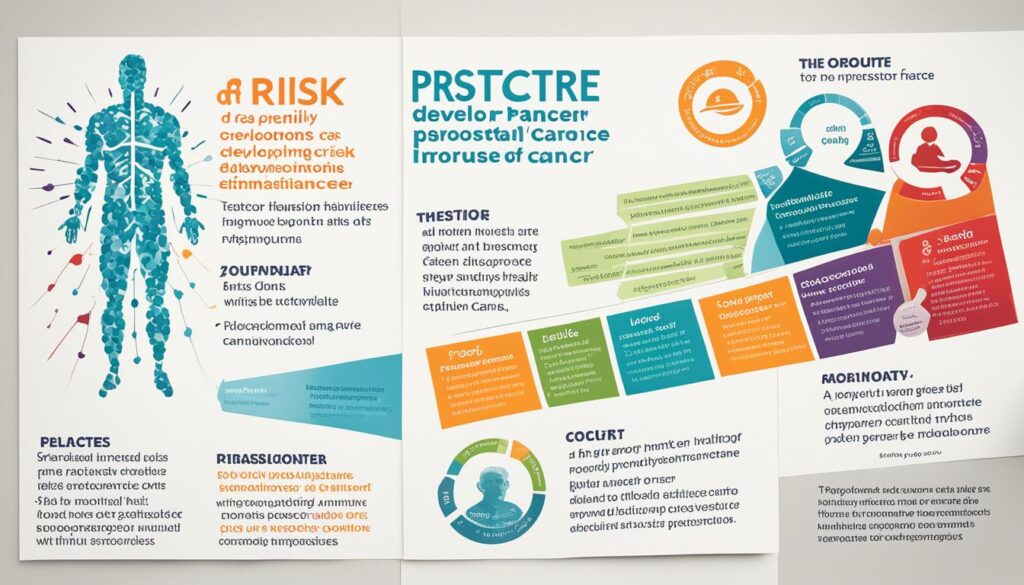
Other Conditions with Similar Symptoms
Prostate cancer shares symptoms with several other conditions. It’s important to consider these alternatives to prostate cancer when experiencing related symptoms. Consulting with a healthcare professional is crucial for an accurate diagnosis.
Conditions with Similar Symptoms:
- Benign Prostatic Hyperplasia (BPH)
- Kidney Stones
- Prostatitis
- Urinary Tract Infections (UTIs)
Symptoms to be Aware of:
| Condition | Symptoms |
|---|---|
| Benign Prostatic Hyperplasia (BPH) | Pain during urination, frequent urination, difficulty starting or stopping urination, bloody urine |
| Kidney Stones | Painful urination, blood in the urine |
| Prostatitis | Painful and difficult urination |
| Urinary Tract Infections (UTIs) | Painful urination, strong urge to urinate despite producing little urine |

Recognizing the symptoms and understanding the potential conditions with similar manifestations will help in getting an accurate diagnosis and appropriate treatment.
Prompt Medical Attention for Prostate Cancer Symptoms
If you experience any signs or symptoms of prostate cancer, seeking medical attention is crucial for early detection and timely treatment. While these symptoms may also be caused by other conditions, it’s important not to ignore them and consult with a healthcare professional for proper diagnosis and guidance.
Prostate cancer is typically more easily treated when detected at an early stage. Timely medical intervention can help prevent the cancer from spreading and improve the chances of successful treatment. Early detection not only increases the likelihood of a positive outcome but also enables the implementation of a personalized treatment plan tailored to your specific needs.
Consulting with an experienced medical provider specialized in prostate cancer will allow for an accurate diagnosis and the recommendation of the most suitable treatment options. They will guide you through the process, provide valuable information, and address any concerns you may have along the way.
“Timely diagnosis is key when it comes to prostate cancer. Seeking medical attention promptly can make a significant difference in a patient’s prognosis and overall outcome.”
Don’t hesitate to discuss any symptoms or concerns with your healthcare provider. Prompt action is essential for effective management of prostate cancer and improving your quality of life. Remember, your health should always be a top priority.

In the next section, we will delve into the diagnosis and treatment options for prostate cancer. Stay informed and empowered in your journey to better prostate health.
Prostate Cancer Diagnosis and Treatment
To effectively diagnose prostate cancer, several tests and screenings may be conducted by healthcare professionals. These procedures enable the detection of abnormalities and the accurate assessment of the cancer’s stage and aggressiveness. Through early detection, personalized treatment plans can be developed to address each individual’s specific needs.
The diagnostic process may include:
- Digital Rectal Exam (DRE): This exam involves a physical examination of the prostate gland through the rectum to feel for any abnormalities or irregularities.
- Prostate-Specific Antigen (PSA) Test: A blood test is performed to measure the levels of PSA, a protein produced by the prostate gland. High levels of PSA may indicate the presence of prostate cancer.
- Imaging Tests: Additional imaging tests, such as MRI, CT scan, or bone scan, may be conducted to provide a more comprehensive evaluation of the prostate and surrounding tissues.
Once the diagnosis is confirmed, healthcare professionals work closely with patients to determine the most appropriate treatment options. The choice of treatment depends on factors such as the stage of the cancer, the patient’s overall health, and individual preferences.
Treatment options for prostate cancer include:
- Surgery: Surgical removal of the prostate gland, known as prostatectomy, may be recommended in certain cases, especially when cancer is confined to the prostate gland.
- Radiation Therapy: High-energy X-rays are used to target and kill cancer cells in the prostate. This treatment can be administered externally or internally through radioactive implants.
- Chemotherapy: Medications are used to destroy cancer cells that have spread beyond the prostate gland. Chemotherapy is often recommended in advanced stages of the disease.
- Cryotherapy: This treatment involves freezing the prostate tissue to destroy cancer cells. It may be used in patients who are not suitable for surgery or radiation therapy.
- Androgen Deprivation Therapy (ADT): ADT aims to slow the growth of prostate cancer by reducing the levels of male hormones that fuel its growth. It may be used in combination with other treatments.
Each treatment option comes with its own considerations, potential side effects, and success rates. A candid discussion with healthcare professionals is crucial in order to make an informed decision about the most suitable treatment plan for each individual.

| Treatment Option | Pros | Cons | Success Rates |
|---|---|---|---|
| Surgery (prostatectomy) | – Removes the cancerous prostate gland. – Potential for full cancer removal. – Low recurrence rates in early stages. | – Risk of surgical complications and side effects. – Potential for urinary incontinence and erectile dysfunction. | High success rates in localized cancers. |
| Radiation Therapy | – Non-invasive treatment option. – Can target and destroy cancer cells effectively. – Suitable for localized and advanced stages. | – Potential for urinary and bowel side effects. – Long-term effects on sexual function. | Varies depending on cancer stage and treatment technique. |
| Chemotherapy | – Targets cancer cells throughout the body. – Potential to slow down disease progression and improve survival in advanced stages. | – May cause various side effects. – Potential impact on overall quality of life. | Varies depending on cancer type and stage. |
| Cryotherapy | – Minimally invasive treatment. – Preserves surrounding healthy tissues during cancer removal. – Suitable for localized and recurrent cases. | – Potential side effects such as urinary issues and sexual dysfunction. – Limited long-term data on effectiveness. | Promising results in select cases. |
| Androgen Deprivation Therapy (ADT) | – Slows down the growth of prostate cancer. – Effective in controlling symptoms and preventing progression in advanced stages. | – Potential for various side effects (e.g., hot flashes, fatigue). – Long-term use may lead to bone density loss and cardiovascular risks. | Varies depending on cancer stage and response. |
Importance of Early Detection and Proactive Health Management
Early detection is paramount in successfully treating prostate cancer. Regular screenings and check-ups play a crucial role in identifying the presence of prostate cancer or any abnormalities that may require further testing. By being proactive in managing your health, including maintaining a healthy diet and exercise routine, you can help reduce the risk of developing prostate cancer. Additionally, it’s essential to be aware of risk factors such as age, race, or family history, and discuss them with a healthcare professional to determine appropriate preventive measures.

Regular screenings and check-ups are vital components of proactive health management. These screenings may include a digital rectal exam (DRE) and a blood test to measure prostate-specific antigen (PSA) levels. These tests can help detect prostate cancer at an early stage when treatment options are most effective.
“Regular screenings and early detection are key factors in saving lives. By identifying prostate cancer early, healthcare providers can recommend appropriate treatment options, resulting in better outcomes for patients.”
Taking preventive measures, such as adopting a healthy lifestyle, can significantly reduce the risk of developing prostate cancer. Incorporating a diet rich in fruits, vegetables, and whole grains, maintaining a healthy weight, and engaging in regular physical activity all contribute to overall prostate health. Avoiding smoking and excessive alcohol consumption is also important.
Preventive Measures for Prostate Health:
- Adopt a healthy diet rich in fruits, vegetables, and whole grains
- Maintain a healthy weight
- Engage in regular physical activity
- Avoid smoking
- Limit alcohol consumption
By prioritizing early detection and practicing proactive health management, you have the power to take control of your prostate health and reduce the risk of developing prostate cancer.
| Benefits of Early Detection and Proactive Health Management | Risk of Delayed Detection or Neglecting Preventive Measures |
|---|---|
|
|
Support and Resources for Prostate Cancer Patients
A diagnosis of prostate cancer can be overwhelming, and during this challenging time, it’s vital to seek support. There are various resources available to help patients and their loved ones cope with the emotional and practical aspects of the diagnosis and treatment journey.
Prostate Cancer Support Groups
Joining a prostate cancer support group can provide valuable resources and a sense of community. These groups consist of individuals who have gone through similar experiences and can offer understanding, empathy, and practical advice. Sharing your concerns and fears with others who have faced prostate cancer can be cathartic and empowering, giving you the emotional support you need.
Support groups can provide a safe space to express your feelings, learn coping strategies, and gain insights from those who have navigated the challenges of a prostate cancer diagnosis and treatment. You can also benefit from the experiences of cancer survivors who have moved forward in their lives after successful treatment.
To find local cancer support groups, reach out to healthcare professionals, cancer treatment centers, or national cancer organizations. They can connect you with support groups that specifically cater to prostate cancer patients and their loved ones.
Coping with Diagnosis and Treatment
Dealing with a prostate cancer diagnosis and subsequent treatment can be physically and emotionally demanding. It’s important to equip yourself with coping mechanisms that will help navigate the journey more effectively. Here are a few strategies that may prove helpful:
- Educate Yourself: Gain knowledge about prostate cancer, its treatment options, and potential side effects. Understanding the process can alleviate anxiety and empower you to make informed decisions.
- Seek Emotional Support: Connect with loved ones who can provide a supportive presence throughout your journey. Sharing your emotions and fears with them can provide comfort and reassurance.
- Practice Self-Care: Take care of your physical and mental well-being by adopting healthy habits. Regular exercise, a balanced diet, and sufficient rest can play a crucial role in your overall well-being and treatment outcomes.
- Communicate with Healthcare Professionals: Maintain open and honest communication with your healthcare team. Address any concerns or questions you may have, and discuss potential side effects or complications. They are there to guide you and provide the necessary support.
- Explore Complementary Therapies: Consider integrating complementary therapies, such as yoga, meditation, or art therapy, into your treatment plan. These practices can promote relaxation, reduce stress, and enhance your overall quality of life.
Remember, every individual’s experience with prostate cancer is unique. It’s essential to find the coping strategies that resonate with you and tailor them to your specific needs.
| Resources for Prostate Cancer Support | Contact Information |
|---|---|
| Prostate Cancer Foundation (PCF) | Website: https://www.pcf.org/ |
| American Cancer Society (ACS) | Website: https://www.cancer.org/ |
| National Cancer Institute (NCI) | Website: https://www.cancer.gov/ |
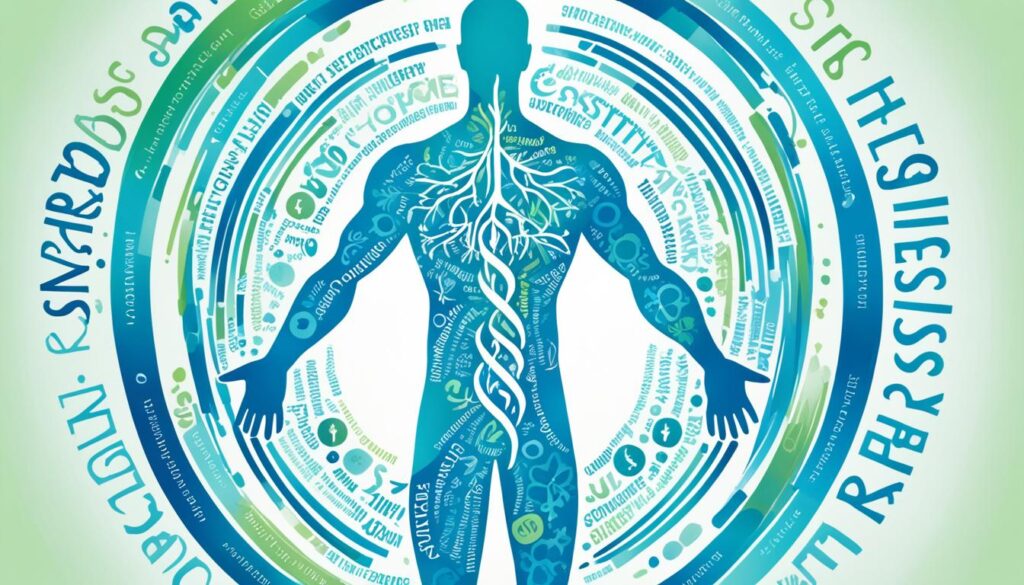
These organizations provide comprehensive information, educational resources, and links to support groups. They are dedicated to helping patients and their loved ones navigate the challenges of a prostate cancer diagnosis and offer a multitude of resources to support your journey.
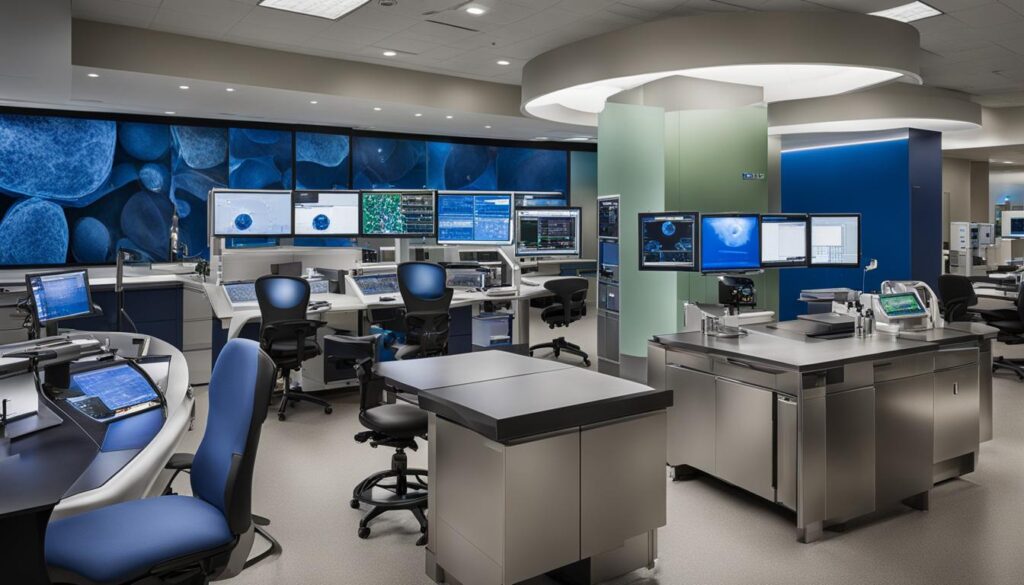
Conclusion
In conclusion, proactive health management and early detection are key in effectively managing prostate cancer. By recognizing the warning signs and seeking prompt medical attention, you can ensure timely treatment and better outcomes. Regular screenings, understanding your risk factors, and taking preventive measures can significantly reduce the risk of developing prostate cancer. Remember to have open and candid discussions with healthcare professionals to determine the most suitable treatment plan for your individual needs.
It is also crucial to utilize the available support groups and resources that can help you and your loved ones navigate the emotional and practical aspects of a prostate cancer diagnosis. By connecting with these resources, you can find valuable information, guidance, and a supportive community for both physical and emotional well-being.
Managing prostate health requires a proactive approach that includes regular screenings, lifestyle modifications, and a collaborative relationship with your healthcare team. With the right support and expertise, you can confidently take charge of your prostate health and overall well-being. Remember, early detection and proactive health management are the key takeaways in the fight against prostate cancer.
FAQ
What are the key warning signs of prostate cancer?
The key warning signs of prostate cancer may include a painful or burning sensation during urination or ejaculation, frequent urination (especially at night), difficulty starting or stopping urination, sudden erectile dysfunction, and the presence of blood in the urine or semen.
What are the risk factors for developing prostate cancer?
The risk factors for developing prostate cancer include age (risk increases after the age of 50), race and ethnicity (higher rates in African American and Caribbean men, lower rates in Asian American and Hispanic/Latino men), and family history (higher risk with a father or brother who has been diagnosed with prostate cancer).
What are some other conditions with symptoms similar to prostate cancer?
Some other conditions with symptoms similar to prostate cancer include benign prostatic hyperplasia (BPH), kidney stones, prostatitis, and urinary tract infections (UTIs).
When should I seek medical attention if I suspect prostate cancer?
It is essential to seek prompt medical attention if you experience any signs or symptoms of prostate cancer, as early detection and timely treatment are crucial for optimal health management.
How is prostate cancer diagnosed and treated?
Prostate cancer can be diagnosed through various tests and screenings, including a digital rectal exam (DRE) and a blood test to measure prostate-specific antigen (PSA) levels. Treatment options for prostate cancer may include surgery, radiation therapy, chemotherapy, cryotherapy, or androgen deprivation therapy (ADT).
Why is early detection and proactive health management important for prostate cancer?
Early detection plays a critical role in the successful treatment of prostate cancer. Regular screenings, understanding risk factors, and proactive health management can significantly reduce the risk of developing prostate cancer and help identify any abnormalities that may require further testing.
Where can I find support and resources for prostate cancer?
Support groups for cancer survivors can provide valuable resources and a community of individuals who have gone through similar experiences. Healthcare professionals and support organizations can also offer support and resources for prostate cancer patients and their loved ones.
What expertise and resources are available at Moffitt Cancer Center?
Moffitt Cancer Center is a renowned institution that offers comprehensive diagnostic testing and treatment options for prostate cancer. Their Urologic Oncology Program specializes in evaluating and treating prostate cancer, providing patients with access to specialized oncologists and rapid access to cancer experts.
How can I effectively manage prostate health and overall well-being?
Maintaining a healthy diet and exercise routine, regular screenings, understanding risk factors, and taking preventive measures can help effectively manage prostate health and reduce the risk of developing prostate cancer.
Source Links

This article is medically reviewed by Dr. Chandril Chugh, Board-Certified Neurologist, providing expert insights and reliable health information.
Dr. Chandril Chugh is a U.S.-trained neurologist with over a decade of experience. Known for his compassionate care, he specializes in treating neurological conditions such as migraines, epilepsy, and Parkinson’s disease. Dr. Chugh is highly regarded for his patient-centered approach and dedication to providing personalized care.



